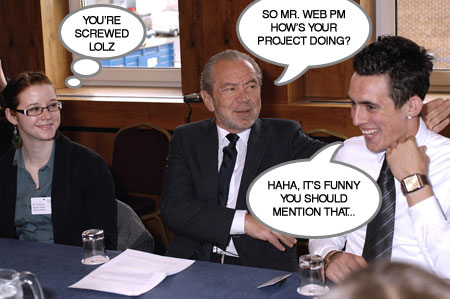After recently reading a really great article by Rob Walling entitled Nine Things Developers Want More Than Money I felt inspired to write a similar series of articles from a Digital Project Manager’s perspective given that most are just as passionate about what they do and aren’t money motivated at all!
Read on to find out what would go a long way to making Digital Project Managers out there a little less Mr. Grumpy Gills…
Note: If you’ve never watched Finding Nemo please do so!
Note to bossman: If you’re reading this, it’s not a whinge, see #3 ;-)
1. A solid pre-sales process
So a brand new digital project is heading your way, it sounds awesome; you’re excited and can’t wait to get your teeth into it. You begin to the review all of the pre-sales documentation with the intention of beginning to plan the digital project.
As you start to break down the project into tasks and allocate time, your digital project management instinct and experience kicks in as the horrid reality dawns on you that the deliverables are ambiguous and what’s been sold looks unrealistic for the time and budget, and at this finite moment in time, you’re the only one that realises it – you bow your head and weep like a little girl.

Inheriting a digital project with these kinds of issues puts the Digital Project Manager in a very tricky situation from the start where one of the first actions is to start to push the client back on things and re-define project scope. This immediately affects how the client feels about you and makes trust that much harder to gain – trust from a client being one of the most important factors in digital project success and is always formed most strongly at the beginning of a business relationship.
When I hear of this situation arising it reminds me of an article by Rob Borley called Under Sell and Over Deliver. The article title pretty much says it all and I’m sure it’s the dream of all the Digital Project Managers out there, much more so than a pay rise.
Have a whinge, then try to fix the problem
However, if you’re finding yourself in this position more and more, rather than bitch and moan (well, at least after bitching and moaning) I would suggest you try doing something to help resolve the situation, for example:
- Speak to the people selling digital projects and explain what the problem is and the position it puts you and the agency in
- Try to get involved in the pre-sales process so you can identify potential issues early on
- Track all project actual vs. actual times so you can give average percentages for project phases (handy when sales people know the budget they have to work with)
- Involve the sales people in parts of projects so they can understand what they’re selling a little more
- Have a major hissy fit at whoever sold the project until they burst into tears
Too often do I hear of people complaining about elements of their job yet they consistently choose to do nothing constructive to try and resolve the situation – to me this is just gutless whining and I have no time for it.
If you have a problem, raise it with the relevant people in a professional manner and try to suggest solutions, in most cases the recipient will be understanding and take your comments on board for next time – and if they don’t, proceed to Step 5.
2. Adequate time to manage projects
Web project management takes time and there is nothing worse than being forced to manage digital projects without enough time to perform even the basic project management necessities e.g. regular monitoring of budgets, schedules and tasks all the way through the lifecycle – but, how much time should a digital project manager need per project? 10%, 15%, 20% of the project?
How much time a digital project manager needs is very much a ‘how long is a piece of string’ question given how different digital projects can be, some are simple and take little time, some are little but have a difficult client and thus take a long time, and others are tantamount to delivering the Death Star project before the Ewoks have a chance to help destroy it.

I read a blog post a while back (but typically can’t find it now) that stated because there is no way to determine how much time should be spent managing digital projects, the only real way to know is to analyse your own time and if you’re finding you don’t have enough time to do the following on a daily basis then you are not being given enough time to effectively manage digital projects:
- Review all budgets
- Review all progress against schedules
- Redefine all tasks completed and left outstanding
- Revise all budgets and schedules accordingly
- Update the client
A common cause for project management overload isn’t in fact that you have too many projects on the go, but you have too many at a similar phase at the same time. As Brad Egeland puts it…
Having your project life cycles staggered is definitely one key to sanity and greatly increases your chances of success. One cannot sanely go through life managing 5 projects that are at the same point in their project life cycles at the same time. The demands on the project manager vary by phase.
Brad Egeland, Managing Multiple Projects – Stagger the Lifecycles
However, it could be argued that you’re not finding the time to do these things because you’re working inefficiently, but if you know you’re a competent digital project manager and have the trust of your boss, this workload analysis holds true and you should raise it with them and hope for understanding and support.
If you don’t raise it as soon as you feel you’re not getting enough time to manage a digital project, the likelihood is that you will probably lose control of the project and the risk of it being over budget, late or of low quality is increased significantly. It will often also result in you getting a smacked bum when perhaps it isn’t fully deserved, and that sucks donkey balls.
A happy digital project manager is one that feels they have enough time to manage all the projects on their list in the right way. As with web designers and developers, if we have enough time to do our jobs properly we feel more confident of delivering high quality projects and that’s what makes us happy much more than money.
3. Trust from your boss
Trust is important to every Digital Project Manager out there and is a key component in digital project management. Trust from your client and your production team, or lack of, can seriously affect the result of any digital project.
I talked about how to gain trust from all of the above in a previous article called Digital Project Management: Honesty, Trust & Integrity and it mainly revolves around conducting yourself at all time in a manner that is clearly seen as being full of honesty and integrity no matter what temptations arise.
But, to a Digital Project Manager, more valuable than any salary is having the trust of your superiors, because as we all know, when managing a digital project you are the person right on the front line at all times, making critical decisions on a daily basis and are ultimately responsible for success or failure, and when this depends on more internal and external factors than you can shake a stick at, well… this is a very precarious position to be in!
I mean let’s face it, when things go well you look like a superhero, a master of your trade and an example to everyone, but, when things don’t go so well, oh my, that is when any Digital Project Manager needs, and needs to see, absolute trust from their boss and for him or her not to go all Alan Sugar on them.

When your boss hears a digital project is coming in over budget or late and you know for certain why, and that the reasons are mostly due to factors outside of your control, for them to listen to your reasons and say “I don’t think you did anything that wrong, digital projects contain too many elements for you to be in full control of at all times.”, this, my Pedigree Chums, is music to our ears.
Digital Project Manager Tip of the Day… Get your boss to read Good Project Management Doesn’t Guarantee Project Success
Of course this reaction is only possible if you have demonstrated in the past that you can effectively control digital projects under the right circumstances and if it is a cast iron known fact that you always take full responsibility and admit fault if that happens to be the case, without that honesty and integrity you will never have trust from anyone.
For a Digital Project Manager no amount of money in the world is a substitute for feeling trusted.
Related reading:
Just keep swimming, just keep swimming!









Another excellent and well considered article Sam, keep them coming! I agree completely with the first three of your five and spent a little while thinking aboutwhat the other two could be…
For me I think one would have to be “being able to rely on your resources”. There are a lot of things to deal with, as you say, when managing a project and one of the ones you could certainly do without is having to worry about how much time you can rely on your team being able to commit to the project. Can you adequately plan or schedule when you don’t know who will be working on the project, for how long, and at what time? No.
This occurs often in my team, who are responsible for several products, and resources have to constantly be juggled from one task to another, on-demand and with little or no notice. This, I could do without!
@Luke, thanks so much! #4 does indeed have the word “reliable” in the title ;-) but it’s not quite what you’re talking about – but biy are you right in what you say. Perhaps I should have done SIX things!
Hi Sam et al,
Just wondered if you’d care to look at a MindMap I made around the “Perfect Project” and give me your take on it?!
Cheers, Myles
Oh, and then as an exercise I evaluated my last five contracts, sub-totalled and totalled them. Then I reweighted slightly for income for a more accurate picture. I wonder what weights others would give to these categories, I think the next one I’d weight more heavily is people. Anyway here’s the Google spreadsheet if anyone fancies looking:
https://spreadsheets.google.com/ccc?key=0Alf1Bmh4ngDadFc2ZTZNRTJOSXFLVG5ENVNGWVUyeFE&hl=en&authkey=CMr6lfgN
Doh! Here’s the aforementioned MindMap link:
http://www.mindmeister.com/83675044/perfect-project